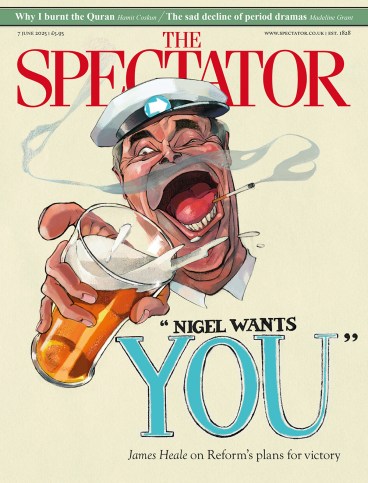
In the great game of musical chairs that is British politics, it’s impossible to foresee which contestant will be left with nowhere to sit when the music stops. Keir Starmer won a landslide victory last July, but has since behaved like a child who has allowed the excitement to go to his head. He agreed immediately to cut the universal winter fuel payment, which made the government look ready to risk short-term unpopularity in pursuit of serious long-term goals. Yet when the unpopularity arrived, he abandoned the measure and with it any claim to long-term thought. As a contributor to one of Lord Ashcroft’s focus groups said this week: ‘He made himself look bad doing it, but he’s made himself look even worse going back on it.’ Who now believes Rachel Reeves has what it takes to get a grip on public spending? But Starmer, who assures us he will always do what is in the national interest, has left Reeves in place.
Kemi Badenoch has been Tory leader only since November, yet already there are elements in the press that say she should go. The parliamentary lobby knows how to cover a Tory leadership crisis. It has had plenty of practice in recent years, but this exhilarating sport goes back through the fall of Thatcher in 1990, the collapse of Macmillan in 1963, the overthrow of Chamberlain in 1940 and the abandonment of Lloyd George in 1922 to the destruction of Peel in 1846.
In the midst of life a Tory leader is in death, but it would be absurd to defenestrate Badenoch after seven months. As a shire Tory (they still exist, albeit in depleted numbers) put it to me this week, fresh from delivering leaflets: ‘“Don’t panic” is the message. That’s easier to say than do when people are saying the Tories are finished, but we need to show steadiness under fire, form a square and see off the enemy cavalry.’
There are no shortcuts to Tory happiness. After 14 years in power, and an election in which it lost 251 seats, the party can’t now act as a repository of protest votes cast by those who say ‘a plague on all your houses’. Demagogues are in hot pursuit of those votes and making extravagant promises with which to outbid Starmer.
To Badenoch’s credit, she has refused to take part in this auction. She knows that bribing voters with ever greater quantities of their own devalued money will end in tears. And so will Starmer’s efforts to render the state properly responsive to what people actually want. Bureaucracies are inherently unresponsive. They form an enormous vested interest, and one which is almost impossible to reform, for who can control the bureaucrats themselves? When asked to do more, they require more money. Officials never declare themselves redundant.
‘Work expands so as to fill the time available for its completion,’ as C. Northcote Parkinson observed. He described how a senior official can become desperately overworked by the effort needed to manage the subordinates supposed to be helping him carry the burden. There must always be at least two of these subordinates, or the official would be creating a rival for his position.
She will need to show that she has the courage required to curb the bureaucracy before it bankrupts us
A week ago, Robert Jenrick, the shadow justice secretary, published a video of himself accosting fare-dodgers on the Tube. ‘Nearly one in 25 people using London’s public transport aren’t paying for it,’ he said. That is a gross underestimate. London residents aged 60 and over mostly travel for free, and so do accompanied children under 11. Jenrick meant nearly one in 25 people who ought to be paying are fare-dodging, but that too is almost certainly an underestimate, for railway companies don’t like to broadcast their own inefficiencies.
Anyone with experience of the NHS knows how difficult it can be to get an appointment. Up and up the spending goes, but never does it equal demand, and as a patient one is made to feel a supplicant who should be grateful for whatever the hard-pressed staff can find time to do. In the welfare state, vast sums are paid to people who don’t need the money, under the pretence that this is an insurance scheme: see above all the triple-locked pension, a sacred cow that will have to be slaughtered if the defence of the realm announced by Starmer is to be paid for.
None of this is easy territory for politicians, but it can no longer be avoided. The government will soon introduce measures, opposed by many Labour MPs, to arrest the unsustainable rise in invalidity benefits. Conservatives will object that the cuts are crude, cruel and will fail to get people into work – and most likely these criticisms will be correct. The duty of an opposition is to oppose. But there will come a time, perhaps inconveniently soon, when it will also be Badenoch’s duty to propose. She will need to show that, unlike her rivals in the game of musical chairs, she has the courage required to curb the bureaucracy before it bankrupts us.

Let me close by declaring an interest. I have bet a friend that Badenoch will lead the Tories into the next general election. The sum involved, £20, is modest, but pride is at stake because he laughed so derisively when I expressed my faith in her.
In my opinion she has a touch of star quality. Her demeanour at Prime Minister’s Questions is admirable: she is unafraid and unimpressed. She’s not as brilliant a debater as William Hague, but everyone knows his ability to score off Tony Blair led to no advance at the 2001 election. Badenoch, admittedly, may lead the party to a result far worse than last year’s. She has to find a way of expressing the small-c conservatism which is the predominant political instinct in these islands. Most of us dislike handing over a large proportion of our income to be wasted by a state bureaucracy which stifles initiative and enterprise, prates of every fashionable nostrum and wishes to turn us into a flock of sheep, dependent on our masters for our livelihood and our opinions.







Comments